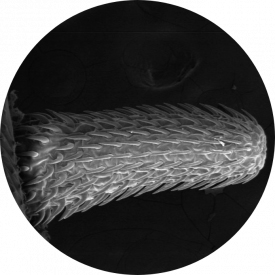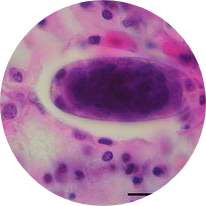 The second research line at the Marine Zoology Unit focuses on parasitological studies of marine vertebrates (mammals, turtles and fish), including taxonomic (both conventional and molecular), ecological and evolutionary aspects. Our pioneering studies on the ecological and evolutionary determinants of cetacean and sea turtle parasitic communities are worth mentioning.
The second research line at the Marine Zoology Unit focuses on parasitological studies of marine vertebrates (mammals, turtles and fish), including taxonomic (both conventional and molecular), ecological and evolutionary aspects. Our pioneering studies on the ecological and evolutionary determinants of cetacean and sea turtle parasitic communities are worth mentioning.
Some of the studies conducted by our group have used parasite data to obtain information on the migrations and social structure of marine mammal populations. We are also conducting applied studies in the fields of fisheries and aquaculture, including studies on the distribution of anisakid nematode larvae in fish for human consumption, parasitology of seriola Seriola dumerili and Atlantic tuna Thunnus thynnus in culture and on other species of interest in Mediterranean aquaculture, and the use of parasite information for predicting the origin of capture fisheries. The Marine Zoology Unit participates in a consortium of six laboratories, funded by the 5th Framework Programme, in the development and optimisation of methods for the determination of hatching and capture sites of cod (CODTRACE). Our Unit contributed to this project by developing techniques based on the analysis of parasitic communities.


 Pool, R.; Romero-Rubira, C.; Raga, J.A.; Fernández, M.; Aznar, F.J. (2021) Determinants of lungworm specificity in five species of cetacean in the western Mediterranean. Parasites & Vectors, 14: 1-14.
Pool, R.; Romero-Rubira, C.; Raga, J.A.; Fernández, M.; Aznar, F.J. (2021) Determinants of lungworm specificity in five species of cetacean in the western Mediterranean. Parasites & Vectors, 14: 1-14. 


